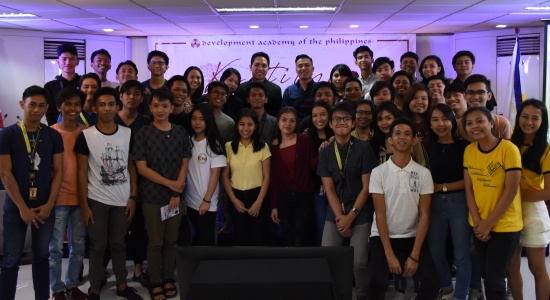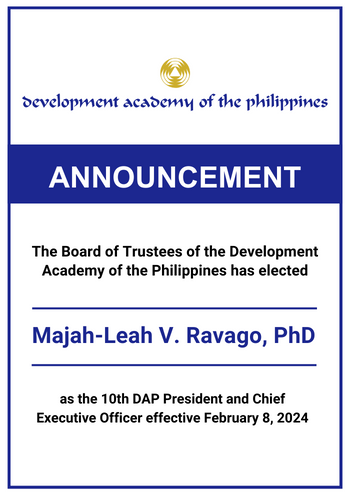
Dr. Gideon Lasco and Dr. Chester Cabalza, both professors of the University of the Philippines, defined the millennial generation and how members of this generation are immersed in the new media or social media, saying such an immersion affects their values and outlook in life.
Lasco and Cabalza spoke about the millennials and how they perceive the new media during the Development Academy of the Philippines’ third Kartilya Session entitled “Millennials and the New Media” that was held last February 23 at the DAP Building in Pasig City.
Social media platforms
“Millennial is someone who’s born from 1982 onwards,” said Lasco even as he gave three mini-critiques on the most used social media platforms – Facebook, Instagram, and Twitter. He claimed that Facebook, being the most influential and popular platform, can serve as a misrepresentation or representation of one’s self.
“It engenders new forms of sociality,” he said, explaining that the number of likes and shares as well as the way people unfriend or unfollow show how they can easily disconnect or connect to people.
However, he emphasized that these forms of sociality can lead to negative and positive outcomes. People, Lasco said, can end up judging others based on their Facebook pages while the number of likes and shares can also become a form of validation where people can feel affirmed and confident.
On the contrary, Lasco identified Instagram as a platform that is removed from all the drama, describing this as the rise of the visual as it contains photographic content that essentially serves as an album for all the beautiful things in a person’s life.
Instagram is also influencing travel by favoring “Instagrammable places” over “un-capturable” experiences. “This can have the negative effect of reducing travel to a photoshoot but can also be the starting point for awareness,” Lasco declared.
Access and alterity, on the other hand, were emphasized by Lasco regarding Twitter as he explained that the users are able to tap into people and the world and to explore alternate identities through the said platform.
“Twitter offers a direct connection with politicians and celebrities, unfiltered with media,” Lasco said as he mentioned the chance of being responded to by celebrities, which offers the possibility of virality. In this case, the use of “hashtags” is prevalent since it allows the people to put social coordinates to their thoughts and participate in national and world events.
Generations
Cabalza, meanwhile, delved into the different generations to further identify the values and personalities of the millennials. He cited the Silent Gen, Boomer, Gen X, Gen Y and Gen Z, stressing that millennials are most likely to be in the Gen Y and Z category. He supported this claim by saying that millennials focus more on their education as they are basically career-oriented individuals.
He further explained the change of paradigm in terms of the way the Silent Gen and millennials think. “Members of the Silent Gen are most likely to work for their paychecks while millennials are more after their passion and contribution to society,” he said.
Cabalza said that a survey from Rappler in 2016 revealed that Filipino millennials also known as “Fillennials” are perceived as confident, driven, self-centered, ambitious and passionate.
Propaganda model
Referring to a book entitled “Manufacturing Consent” by Edward S. Herman and Noam Chomsky, Cabalza mentioned five filters in the “propaganda model” of inequality of wealth and powers and its multilevel effects on mass media interests and choices. These are size, ownership and profit orientation; advertising license to do business; sourcing mass media news; flak and enforcers; and anti-communism.
The question, according to Cabalza, in the change from mass media to social media in terms of popular patronage is not whether people have a choice to do social media, but “how well” they do it.
Considering all the future trends that can happen in society, Cabalza and Lasco advised everyone to always check the facts before posting anything on social media and to make virality a force for the good of people. — Jeannalla Burns




